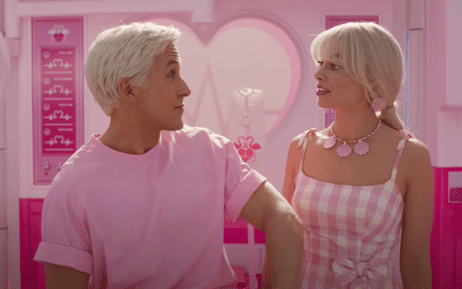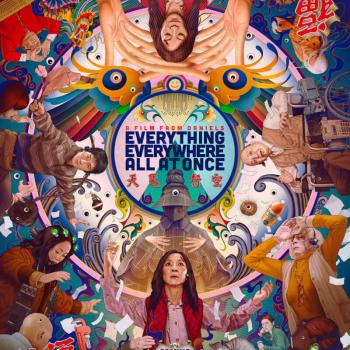
By Dr. Sam Rader
Greta Gerwig’s newest feminist film Barbie, produced by Mattel and co-written with her husband filmmaker Noah Baumbach, uplifts women while exalting the idiocrasy of men.
Every male character in the film is portrayed as helpless and idiotic, from start to finish—all the Kens, the Mattel execs, even the man who plays America Ferrera’s husband (who happens to be her husband in real life).
In Barbie, all men are treated as ridiculous and subhuman and in the end, this is never redeemed.
In the fictional “Barbie Land,” gender roles are reversed: Women own property, they work as doctors and lawmakers, and men are subjugated to compete with one another for the attention of these powerful women.
It’s actually kind of genius–The film uses men as the proxy for the ways that women have been historically oppressed by the patriarchy. And yes, this oppression is real.
It is unfair and unconscionable the ways that women have been treated by men. But it hurts my heart that people think it’s cool, funny or the right answer to turn around and treat men the exact same way.
When I searched the word “Barbie” prepping for this article, my Google homepage turned Barbie Pink and began glittering with motion-graphic cartoon stars. It feels like everyone is hopping on the Barbie bandwagon and I want us to start talking about how potentially destructive its messaging is for the next generation.
Spoiler alert—The main plot point of the film is that Ken and Barbie travel to the “real world” where they learn that here the roles are reversed, and men are in charge. Ken takes this knowledge back to Barbie Land and bands together with his fellow Kens to brainwash the Barbies into becoming subservient dolls (exactly who the Kens were at the beginning of the film).
The climax and turning point of the story is when America Ferrera’s character deprograms the Barbies by reciting to them the painful paradoxes they’ve been conditioned to live within as women.
She says, “It is literally impossible to be a woman…You have to be thin but not too thin. And you can never say you want to be thin. You have to say you want to be healthy. But also, you have to be thin. You have to have money, but you can’t ask for money because that’s crass. You have to be a boss, but you can’t be mean. You have to lead but you can’t squash other people’s ideas. You’re supposed to love being a mother, but don’t talk about your kids all the damn time. You have to be a career woman, but also always be looking out for other people. You have to answer for men’s bad behavior, which is insane. But if you point that out, you’re accused of complaining. You’re supposed to stay pretty for men but not so pretty that you tempt them too much or that you’ve threatened other women, because you’re supposed to be a part of the sisterhood.”
Well, all of this is obviously true.
But what might be hard to admit is that men also live within the confines of confusing paradoxes, such as: Approach women but don’t be creepy. Don’t be a pussy but don’t you dare dominate. Pay for dates but don’t see yourself as the breadwinner. Fix the patriarchy but don’t insert yourself because we’re tired of hearing you speak.
It’s a hard time for all of us to know how to act. Every one of us needs empathy and uplifting, not just women.
At the end of the Barbie movie, the old status quo is restored with women back on top—reclaiming their private property and seats on the Supreme Court—and men back to zero rights or dignity. The Kens are told that they should try less hard and settle for being “Ken-ough.”
Their final moment is when Simu Liu’s Ken humbly and earnestly begs Issa Rae’s Barbie, “Madame President, may the Kens please have one Supreme Court Justice?” She laughs bitterly, “Oh I can’t do that,” then adds patronizingly, “But maybe a lower circuit court judge.”
The film’s British female narrator concludes, “Well the Kens have to start somewhere. And one day, the Ken’s will have as much power and influence in Barbie Land as women have in the real world.” Ouch.
Does the film uplift and empower women? Yes. And thank God for that. But it does so at the expense of men.
The effect is like watching a little girl who’s been shoved one too many times on the playground gaily skipping toward the boys to shove back.
This idea that one gender must be positioned above the other or pitted against one another is exhausting and sad.
Most individuals who have voiced complaints about this film are conservative men, which is why I wanted to speak up as a liberal woman with a PhD in psychology. From my personal and professional experience, I see the danger in any “us-versus-them” mentality, and I stand for the care and fair treatment of all living beings.
I find that so much of feminism these days is rooted in man-bashing and man-hating. And our idea of “feminist” entertainment is putting women in traditionally masculine roles, such as superheroes and action stars.
Superheroes and action stars are glorified for killing dozens of un-storied human bodies in every successful movie. This is not what is sacred about what women are capable of.
In 2020, filmmaker Britt Marling wrote a New York Times Opinion piece called I Don’t Want to Be the Strong Female Lead, where she eloquently makes the point I’ve been aching to for years—that what is actually beautiful and powerful about women is our “empathy, vulnerability, [and] listening.”
If we want to show the true power of the feminine on the silver screen, it won’t be through poking fun at men, nor killing men in action flicks.
The power of the feminine is to transcend our painfully polarized world and liberate humanity from the paradigm of dominance and fighting, ushering in a new paradigm of Interbeing and higher love.
This is why I don’t identify as a feminist, but rather a feminine-ist.
I believe that what is going to change this world is integrating more feminine energy—the wisdom of interdependence, nurturing, care, and a nonzero-sum game where everyone wins when we work together.
It seems that #girlpower is trying to fight men at their own game. I believe #womanpower is what we really need—the vision to guide humanity toward a beautiful world beyond the fight.
A matriarchy does not compete. A matriarchy does not wage wars. A matriarchy nourishes the goodness that lives deep within everyone’s core. A matriarchy sets the example for a new world rather than fighting with the old one.
Of course, we still need accountability and boundaries. But I would rather we move into restorative justice than to continue the cycle of punishment, shame, and rage.
All of us have masculine and feminine energy inside. Both are incredible and essential.
I love that my masculine part has the power to stand up and write a potentially controversial article like this. And I cherish that my feminine part has the wisdom to know that the way to get to where we really want to go is to recognize the sacredness of both masculine and feminine power and learn how to work together to create a more beautiful world.
The truth is that all of us—men, women, and gender nonbinary—are victims of the patriarchy.
The patriarchy’s outdated values set a tone where human beings are pitted against one another as competitors for limited resources. Femininity, vulnerability, relationality, and contentment are seen as inferior. Domination, toughness, individuality, and ambition are exalted as superior.
This system hardens women and turns men into the loneliest people on the planet. The American Foundation for Suicide Prevention reports that men are four times as likely to die by suicide than women. Our little boys are raised without enough physical touch, and without support or guidance for how to process the rich, complex emotions that they experience, just like women do.
As women, we have one another. It is normalized and natural for us to hug and touch each other, to process our feelings, and to lean on real support and community.
No wonder men continue to act out and uphold a broken system where their only capital is the ability to dominate. They don’t have connection. How else are they supposed to cobble together a sense of self?
In my 18 years as a practicing psychologist, and now as creator of Source Code (a new healing modality focused on the symbolic rather than the concrete), the majority of men who come to me seeking help are afraid of their own phallus.
They’ve been taught that men are bastards, and they worry that the phallic part of themselves is an imposing thing. They sometimes carry nightmarish fantasies that their manhood will impale those whom they love if they’re not careful.
These men have what I call the Constricted Coping Style, which means they are ashamed and afraid to expose any primal instinctive part of themselves. They feel they must tighten their bodies and hold in their feelings and desires. They tuck their proverbial phallus to act like a genital-less Ken doll, attempting to hide this essential, natural part of themselves.
And just like anything that’s repressed, this phallic energy ends up coming out sideways. They have secret porn addictions, they go to sex workers, or they use their pent-up aggression to play violent video games.
Caring men no longer know where to put this symbolic and literal part of themselves. They want to be good, and no one has shown them what the good masculine looks like.
Masculine energy is not inherently toxic. The old patriarchy is.
Men need to be liberated just as much as women do. They need to be shown that masculine power can be used for good—to protect, provide, uplift, support, contain and guide.
Let’s stop castrating men and instead show them how to truly serve themselves, one another, and all of us.
If you watched the Barbie movie and loved it, I don’t blame you. There were some incredibly funny and poignant moments, such as when Ryan Gosling’s Ken enters the real world to gleefully discover that it’s run by men on horses.
But from the bottom of my heart, I ask: Can you imagine an alternate ending, rather than shoving back? How would the deepest part of your heart want to see this story end?
If we are ready to welcome a new era of healthy masculinity and true feminine empowerment, we must put down the sword of toxic patriarchy that is used to cut others down, once and for all.













